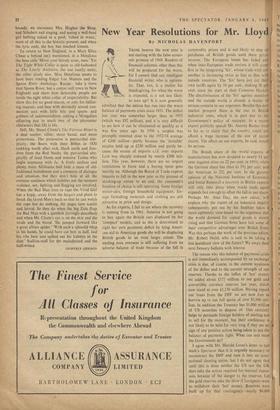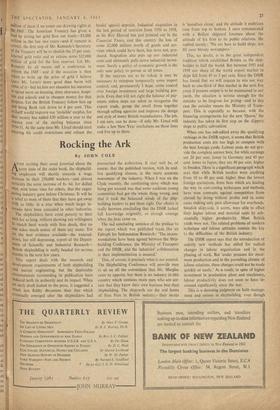New Year Resolutions for Mr. Lloyd,
By NICHOLAS .DAVENPORT THANK heaven the new year is not starting with the false econo- mic promise of 1960. Readers of financial columns other, than this will be prepared for the worst, for I cannot find any intelligent financial writer who is optimis- tic. That, too, is a matter for thanksgiving, for when the worst is expected, is it not less likely to turn up? It is now generally admitted that the nation has run into the worst balance of payments crisis since 1951. The deficit last year was somewhat larger than in 1955 (which was £92 million), and it is very difficult to see how it can be eliminated as quickly as it was five years ago. In 1956 a surplus ,was promptly restored close to the 1952-54 average of £200 million—partly because the 'invisible' surplus held up at £230 million and partly be- cause the excess of imports c.i.f. over exports fob was sharply reduced by nearly £300 mil- lion. This year, however, there are no import restrictions in force and a buying spree goes merrily on. Although the Board of Trade expects imports to fall in the new year as the process of stocking-up comes to an end, the consumer's freedom of choice is still operating. Some foreign motor-cars, foreign household equipment, for- eign furnishing materials and clothing are still attractive in price and design.
As for exports, I fail to see where the recovery i-, coming from in 1961. America is not going to buy again the British cars displaced by her 'compact' models, and as she is determined to right her own payments deficit by tying Ameri- can aid to American goods she will be displacing British goods to an even larger extent. The sterling area overseas is still suffering from an adverse balance of trade because of the fall in
commodity prices and is not likely to step up purchases of, British goods until these prics recover. The European boom has faded and when inter-European trade revives it will come first in the integrating 'Six', whose trade with one another is increasing twice as fast as that with outside countries. The 'Six' have just cut their own tariffs again by 10 per cent., making 30 per cent. since the start of their Common Market. The discrimination of the Six' against ourselves and the outside world is already a matter of serious concern to our exporters. Besides this new market prospect there is the rise in British industrial costs, which is in part due to the Government's policy of restraint. In a recent export publicity speech Mr. Antony Barber went so far as to claim that the country could not afford a wage increase of the size of recent claims. The effect on our exports, he said, would be serious.
The British share of the world exports of manufactures has now dropped to nearly 15 per cent. (against close on 22 per cent. in 1951), while the German share has risen to 19+ per cent. and the American to 221 per cent. In the gloomy opinion of the National Institute of Economic and Social Research a recovery in British exports will only take place when world trade again expands fast enough to offset the fall in our sharel, Perhaps Mr. Alan Day, the new editor, with explain why the report of an industrial inquiry, subsequently put out by his Institute takes a more optimistic view based on the argument that the world demand for capital goods is slowly rising and that German firms have lost some of their competitive advantages over British firms. Was this perhaps the work of the previous editor, Mr. Robert Neild, who is said to be taking a less jaundiced view of the future? We await their next January bulletin with interest.
The reason why this balance of payment's crisis is not immediately accompanied by an exchange crisis is due, of course, to the current weakness of the dollar and to the current strength of our reserves. Thanks to the influx of 'hot' money we added about £177 million to our gold and convertible currency reserves last year, which now stand at over £1,150 million. Having repaid our loans from the IMF we are now free to borrow up to our full quota of over $1,900 mil- lion. In addition the Treasury has $1,000 million of US securities to dispose of. This certainly helps to persuade foreign holders of sterling not to. sell for the moment, but their confidence is not likely to be held for very long if they see no sign of any positive action being taken to put the balance of payments right. What can and must the Government do?
I agree with Mr. Harold Lever's letter in last week's Spectator that it is urgently necessary to
reconstruct the IMF and turn it into an inter- national clearing union, but I do not agree that until this is done neither the US nor the UK dare take the action required for internal expan- sion because of the danger to the reserves. Let the gold reserves take the blow if foreigners want to withdraw their 'hot' money. Reserves were built up for that contingency—nearly $6,000
Million of them if we count our drawing rights at the IMF. The American Treasury has given a lead by letting her gold flow out freely—$3,000 million in the last two years—and if rumour is correct, the first step of Mr. Kennedy's Secretary of the Treasury will be to abolish the 25 per cent. Internal gold ratio and so release some $12.000 million of gold for the free reserves. Let Mr. Kennedy by all means call a conference to reform the IMF--and if the occasion is then taken to write up the price of gold -I believe (Pace Mr. Lever) more good than harm will come of it—but let him not abandon his intention to spend more on housing, slum clearance, hospi- tals and schools and to cheapen money for that Purpose. Let the British Treasury follow him up a.nd bring Bank rate down to 4 per cent. This la itself would improve our 'invisible' surplus, for dear money has added £50 million a year to the interest cost of the sterling balances since 1950-51. At the same time Mr. Lloyd should start relaxing his credit restrictions and release the banks' special deposits. Industrial stagnation in the last period of restraint from 1956 to 1958, as Sir Roy Harrod has just pointed out in the Financial Times, cost this country the loss of some £2,000 million worth of goods and ser- vices which could have been, but were not, pro- duced. Stagnation also puts up our industrial costs and ultimately pulls down industrial invest- ment. Surely a policy of economic growth is the only sane policy to pursue at all times.
If the reserves are to be risked, it may be necessary to reimpose temporarily sonic import control, and, permanently I hope, some control over foreign investment and large building pro- jects. Even that will not right the balance of pay- ments unless steps are taken to reorganise the export trade, group the small firms together through selling agencies and improve the design and style of many British manufactures. The job, I am sure, can be done—if only Mr. Lloyd will make a few New Year resolutions on these lines and live up to them.











































 Previous page
Previous page